Beware of Maya
- Details
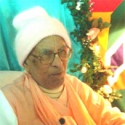
The Guru has no attachment to anyone, but he is merciful. He is only attached to Sri Sri Radha and Krsna. He has no lust for anything in this world. He has no time at all for anything or anyone else...
A Phoned Lecture
- Details
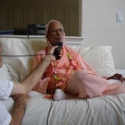
On the evening of June 6, 2004, at the home of Vinodini and Arun Verma in Houston, Texas, Srila Narayana Maharaja gave a lecture near a speaker phone to 400 devotees in North Carolina. A large festival had been arranged for his weeklong hari-katha in North Carolina, but on the day he was supposed to fly there he was advised to change his plans because of health reasons...
Boycott The Sahajiya-Babajis
- Details
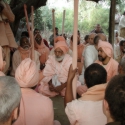
I want to explain something so that you will be very careful. I am receiving questions about the books published by the babajis of Vraja. They accept Sri Caitanya Mahaprabhu, Sri Nityananda Prabhu, and Sri Sri Radha-Krsna Conjugal. They have not written their own books. They only take books like Stava-mala by Srila Rupa Gosvami...
The Means To The Ends
- Details
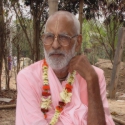
Vraja-prema can never come if one thinks, "My son is the Supreme Lord." If you want to have Vraja-prema one day, then, like the Vrajavasis, you will have to forget that Krsna is the Supreme Lord...
The Eleventh Canto
- Details
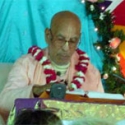
Don't disobey Guru, otherwise you will fall down. You should know that Gurudeva is our most dear friend. You should obey and serve him, and by that service you should always serve the divine couple Sri Sri Radha and Krsna. This is the easiest method to attain Them...
Lord Siva's Highest Benediction
- Details
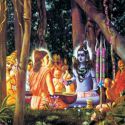
Once, the great sage Narada Muni traveled to the abode of Lord Siva and began to glorify him, saying, "You are very near and dear to the Supreme Lord Krsna. Not only that, you are Krsna's manifestation; you are non-different from Him. You can give liberation and also Krsna-prema, the rare jewel of transcendental love for Krsna."
Bhakti And Mukti
- Details
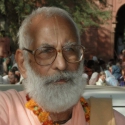
You should know all siddhanta (established truths), be very humble, and honor everyone. If you are not giving proper honor to others, and instead you are thinking, "I know more than anyone," then you may even challenge your gurudeva. You may challenge Krsna, Mahaprabhu, and Rupa Gosvami. When you speak, you will take credit for yourself rather than giving credit to our acaryas. Don't do this...
Introducing the Eleventh Canto
- Details
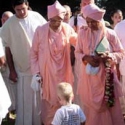
If anyone will hear Srimad-Bhagavatam with strong faith and great honor, Lord Sri Krsna will be pleased with him and give him bhakti. That devotee will no longer experience lamentation (soka), illusion (moha), or fear (bhaya) from anything. He will cross over the cycle of birth and death forever. Therefore, Srila Vyasadeva has kindly manifested the Srimad-Bhagavatam...
On Good Communication
- Details
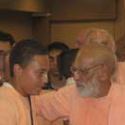
First try to give up all the manifestations of your false ego - like anger. If you have so much anger, you cannot understand topics about bhakti...
We should try to understand the suffering of another person. We should try to keep our own mood concealed, and try to accept and hear the other person's mood. We should try to understand the happiness and distress of another....
Offer Yourself, Not Just the Mango
- Details
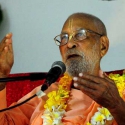
What is karma? Karma is any activity or endeavor that is performed with a desire to enjoy the result. If you are chanting, remembering, or performing any other devotional activity, but you want to enjoy the results of those activities, that is called karma-misra (misra means ‘mixture’) bhakti.
The Second Stage of Bhakti
- Details
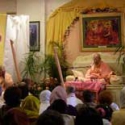
Nowadays I see that devotees have so many problems, and because of these problems, they cannot chant regularly. Sometimes they are restless and upset, and thus they give up worshipping Thakurji (the deity), chanting, remembering and reading books. I have come to remind you to not be like that; do not be weak...
How to Read Srila Gurudeva's Books
- Details
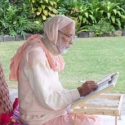
We should treat all the books of the Gosvamis as our siksa-gurus. We should offer pranama to the books, and then read them. If we do this, we will realize that all siddhanta is coming automatically in our heart. This is the process of reading ‒ not reading, but serving ‒ the books...
No Control Over Freedom
- Details
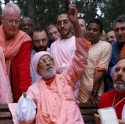
Even nama-aparadha is not ordinary, it is high-class. Nama-aparadha is of so many of kinds and gradations, not only one kind; for example one of the varieties is vaishnava-aparadha. Actually, it is very good that one is chanting nama-aparadha. That will bring one to nama-abhasa, nama-abhasa will bring one to suddha-nama, (pure chanting of the holy name, wherein Krsna is revealed as non-different from His name) and that will bring one to a still better stage, prema-bhakti...
You Can Make Easy Money By Nama Aparadha
- Details
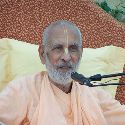
Suppose there is a person who is committing many offences, who is a murderer, who slaughters cows, and who is full of bad qualities. Suppose that sinful person somehow chants Hare Krsna Hare Krsna, Krsna Krsna Hare Hare. Will his chanting have any effect or not? What will be the gain? What will be the result?
Guru Nanak - Birmingham, UK: June 15, 2003 (Part 1)
- Details
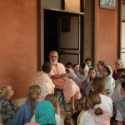
Guru Nanak is a guru who gave transcendental love and affection for the Supreme Lord. Gobind Singh is in his dynasty, or guru-parampara, as we see there in his portrait. The Sikhs were originally Hindus, and they are still Hindus. Their religious principle was to save Hindu and Sanatana-dharma from the clutches of the Muslims...
Why Srila Vyasadeva Wrote Srimad Bhagavatam
- Details

This world is full of misery and very perishable. Very soon we will become old, and when we become too old we will have to give up these bodies. What we are collecting from this world - money position and so on - we cannot take with us. You are not this physical body, so don't quarrel because of it. Don't worry for this body; it is a bag of urine, stool, blood and so many similar substances. The soul is there and it is eternal, but maya has captured it in this body...
Page 6 of 48